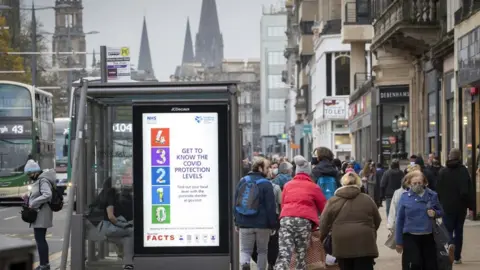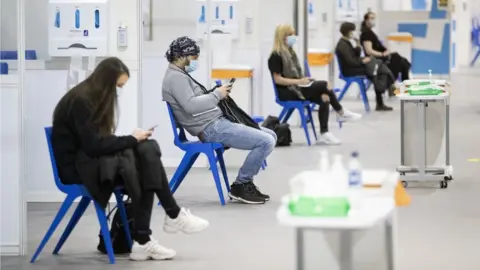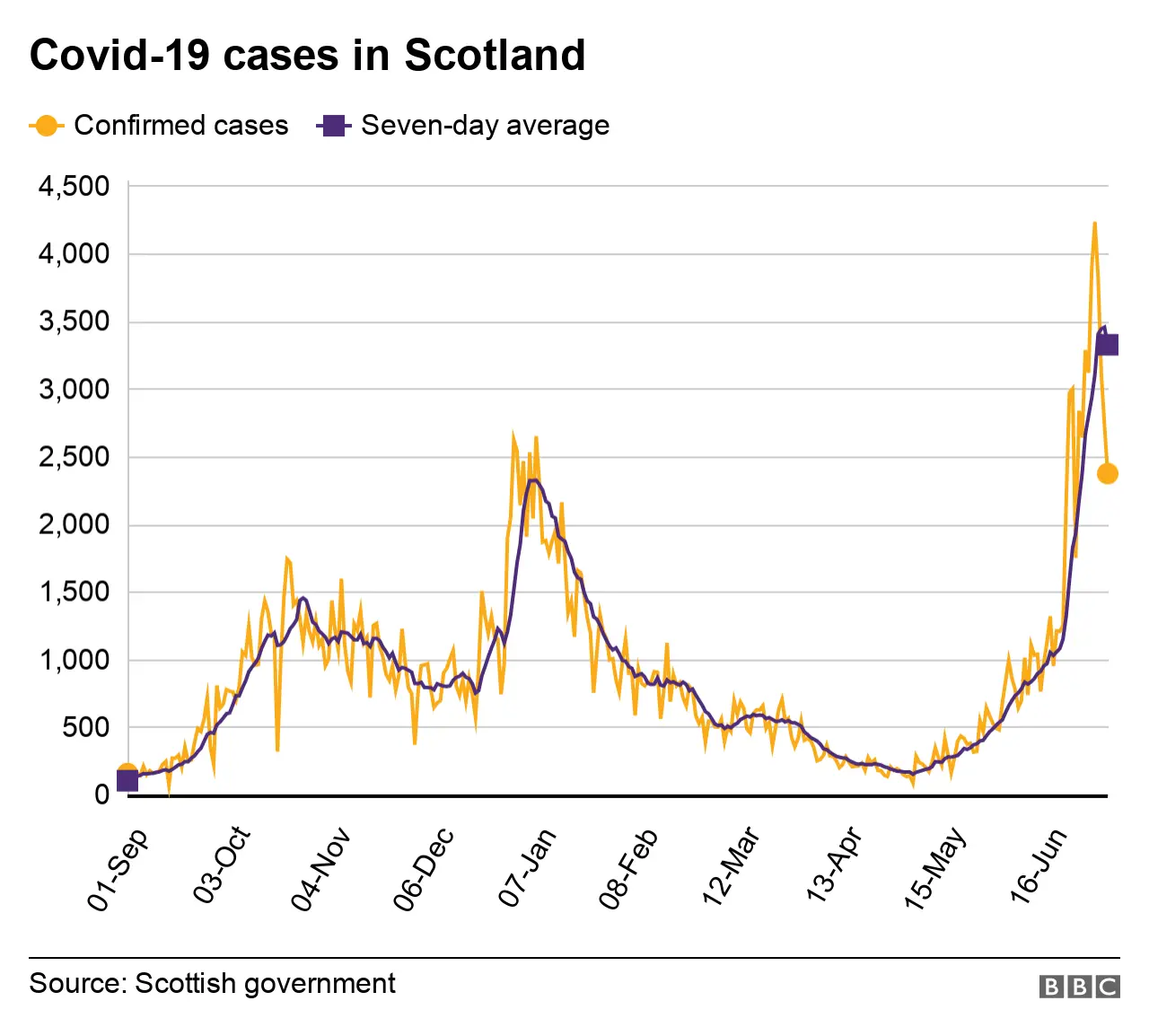Covid in Scotland: Restrictions to end as planned
 PA Media
PA MediaScotland is still on track to see Covid restrictions lifted next month, the Scottish government has said.
Finance Secretary Kate Forbes said the plan was for Scotland to move to level zero on 19 July, with remaining legal restrictions lifted on 9 August.
Ms Forbes said the data would be closely monitored, after it was revealed that Scotland has the highest Covid rates in Europe.
Most of England's Covid restrictions are due to end on 19 July.
On Monday, Prime Minister Boris Johnson confirmed that in England face masks will no longer be legally required and distancing rules will be scrapped.
Speaking to BBC Radio's Good Morning Scotland programme, Ms Forbes said many restrictions would be eased as planned in Scotland too - despite the record high number of Covid cases reported in recent weeks.
However, she said some measures, such as the wearing of face coverings, would remain in place in Scotland.
"We expect some baseline measures - for example face masks, some limitations on working from home and so on - will continue for a longer period of time," she said.
 PA Media
PA Media"We are lifting the limits and lifting as much of the legal restrictions as possible. So that means physical distancing, it means the attendee caps on, for example, life events like weddings or being in stadiums and that kind of thing.
"But we do think that there will still be some baseline measures, for example, the wearing of face masks which will continue for a longer period of time."
She said the virus was still with us, and that we were at a "fragile moment" in the pandemic.
Although the virus is still highly contagious, the link between transmission and hospitalisation has been weakened but not broken completely, she said.
The finance secretary added that the data was being closely monitored, and that the plans for what will be lifted on 19 July would be unveiled on 13 July.

Scotland's exit from lockdown is following the same pattern as much of the rest of the pandemic.
The rhetoric from politicians in Edinburgh is notably more cautious than that of their counterparts in London, but ultimately they are all traveling on the same path.
Words like "irreversible" and "guarantee" are absent, but ministers still bat away any question of delaying their plans or re-imposing any restrictions.
And while there is talk of retaining "mitigations" like face coverings, it remains unclear whether this will be a legal requirement, or simply guidance - and thus in effect no different to plans down south.
There is a particular challenge for politicians, who are pulled in different directions by the complexities of the pandemic and managing the public's expectations as well as their behaviour.
The Scottish government has developed a reputation as a careful, canny operation - but ministers also apparently feel compelled to lift restrictions despite case numbers hitting record highs.
And the opposition Scottish Conservatives are in a similarly curious bind, finding themselves stressing how awful the situation is - while insisting that ministers continue with the current plan.

The Scottish Conservatives' Douglas Ross said it was time to learn to live with the virus, and called for restrictions to be eased as planned in the weeks ahead.
He told Good Morning Scotland: "People die from a number of ailments all the time. And we have to learn to live with Covid-19. It's going to be with us going forward and I think it is time to start to get our lives back to normal as much as possible."
He said there were other harms caused by Covid restrictions.
"We are also seeing people during this pandemic dying from cancer - because they weren't diagnosed in time, or couldn't get their treatment, or they didn't feel they were able to go and see their doctor or get an appointment at hospital over the last 16 months," he said.
"We cannot simply say we are going to keep lockdown to stop people dying from Covid if they are suffering or dying of other illnesses."
On whether people should continue to be mandated to wear face masks, Mr Ross said it should be a personal decision.
"I think that is a personal decision and one that is perfectly acceptable," he said.

On Monday, there were 2,372 new cases of Covid confirmed in Scotland. Last week saw the most Covid-19 cases than at any point during the pandemic, with a peak of 4,234 new infections recorded on 1 July.
The national clinical director, Prof Jason Leitch, attributed this to a lack of "natural immunity" in the population.
He said Scotland had been hit hard by the more infectious Delta variant becoming "seeded" in Glasgow.
Prof Leitch also linked the surge in part to people gathering to watch Euro 2020 matches.
However, he said hospital admissions and deaths were not rising at the same rates they were earlier in the pandemic - because of the protection offered by vaccination.
He added that a "big wave" of Covid infections, fuelled by the Delta strain, was likely to overtake other parts of Europe in the weeks ahead.


